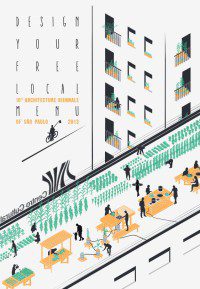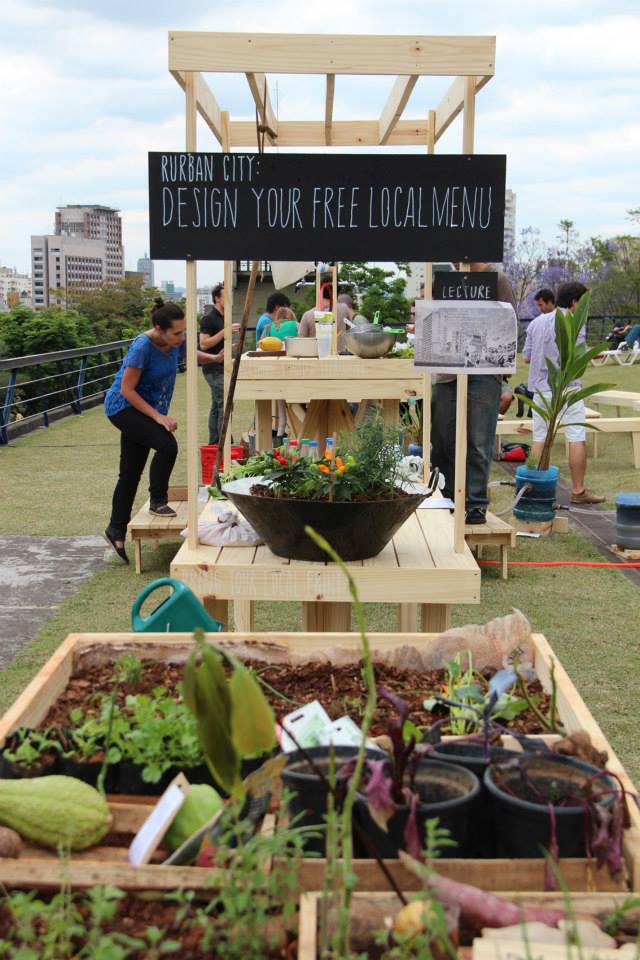Design your free local menu! X Bienal de Arquitetura de São Paulo
~
 the documentation booklet is available here
the documentation booklet is available here
Brasil, Daniela; König, Bernhard (eds.) Design Your Free Local Menu
10th Architecture Biennial of São Paulo 2013
TU Graz Verlag, Graz, 2015.
ISBN: 978-3-85125-403-7 (24 pp. Eng)
project by:
fruitmap.at
TU Graz, Institute for Architecture and Landscape, LANDLAB i_a&l
in collaboration with:
TU Graz, Institute for Contemporary Art
project team São Paulo:
Andreas Goritschnig, Anna Resch, Bernhard König, Daniela Brasil, Lisa Enzenhofer, Julian Gatterer, Patricia Wess, Thomas Kalcher
collaboration for the kitchen in São Paulo:
Hortelões Urbanos e Muda-SP
Árvores Vivas, Come-se / Neide Rigo
CitronCCSP

BACKGROUND
Today we believe with a calm certainty that the majority of humanity lives in cities and is therefore seemingly independent from nature and removed from natural processes. Nature is increasingly perceived as dangerous, unpredictable, and even foreign. As a result, green is considered more of a color, a decorative element or a technological advancement, rather than a part of natural processes. Open green spaces are most commonly perceived as a dog toilet or no man’s land.
Yet green infrastructures for the inner city will play a key role in the future of urban climate moderation. Trees especially are able to reduce the concentration of heat with their shade and increase the comfort level of inhabitation through the evaporation process they perform. Green rooftops and walls reduce the quantity of heating and cooling, as well as the building’s temperature albedo. Furthermore, green infrastructures can pay a considerable contribution to rain water retention. To effectively moderate the future urban climate and evade potential effects of climate change, we will have to increase the amount of urban green, even in face of simultaneously experiencing an increasing population density in which land and ground value is exposed to enormous utilization pressure.
It seems that in the urban population, the growing awareness of climate change coincides with an increasing loss of practical and sensorial abilities in the handling of natural and ecological processes. Nature is long gone from our everyday and individual competence. It is a prerequisite to integrate daily urban practices with the usage and cultivation of urban greenery, if our urban landscapes are to become an active component of the regional and global ecosystem. Nature has to become an integral aspect of the practice of urbanity.
DESIGN YOUR FREE LOCAL MENU!
„Design your free local menu!“ evolved from fruitmap.at – an online-platform to make aware of potentials of our urban green, like mapping fruit-bearing trees in public space – an open urban harvesting landscape. „Design your free local menu!“ provides open cooking actions, where fruits, vegetables, greens and blossoms that are available for free in public space are cooked and used for delicious meals. Everybody can bring in fruits and start cooking – considering a few basic rules regarding the harvesting and the collaborative cooking.
„Design your free local menu!“ tries to tap new areas and in between spaces of our rural and urban environments. Within urban brownfields or traffic islands, the cooking-together of people from different backgrounds is an intentional micropolitical effect. The menu itself differs depending on the site, its latitude and the season. Blossom buffets in front of the city palace, carrot cakes in abandoned fields or fallen-fruit-parties on a square next door.
„Design your free local menu!“ are explicitly temporary cultural happenings to make aware of the precious and delicious resources through re-interpretation of public space. By sharing a meal while designing something beautiful and tasty, new values and potentials can be discovered within our public green infrastructures.
X BIENAL DE ARQUITETURA DE SÃO PAULO
In São Paulo X Architecture Biennale, an experimental kitchen located on the rooftop of the CCSP has been offered as a space for exchange and critical reflections within cooking actions. The kitchen and its usage is developed in cooperation with Hortelões Urbanos, Árvores Vivas, Come-se/Neide Rigo — and is still open for more associations, movements and local actors who want to join in!
~